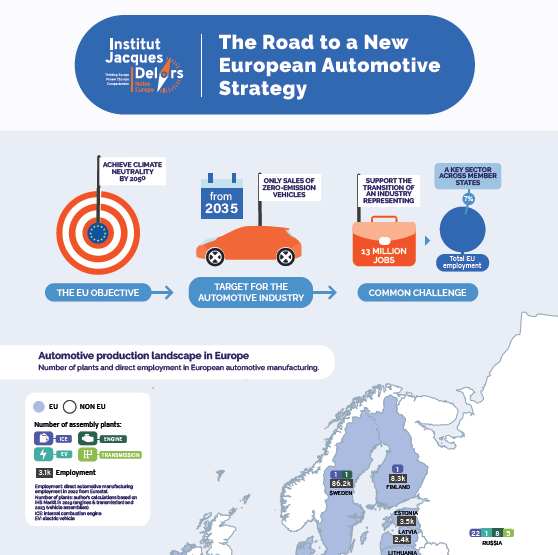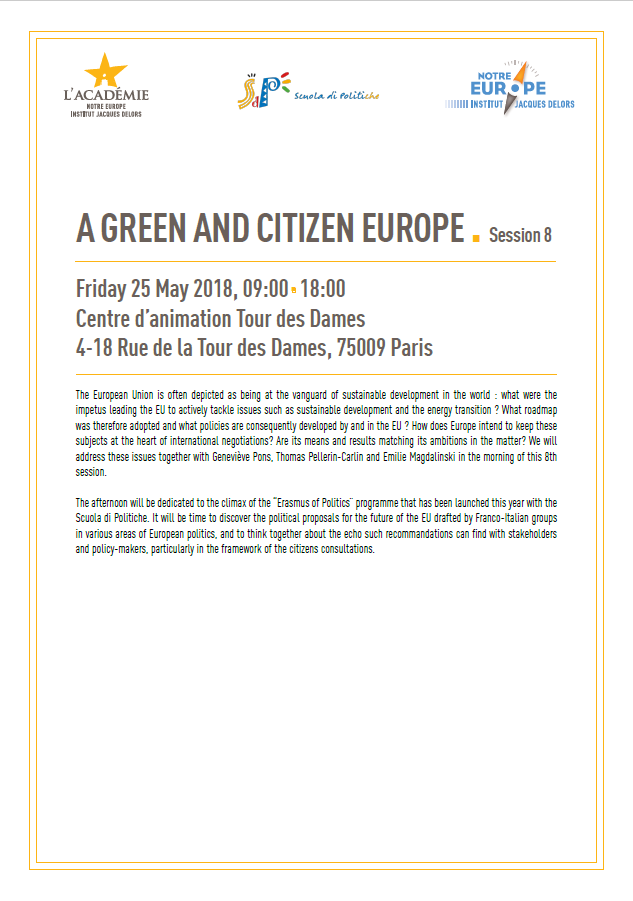This autumn 2021, Europe is experiencing an energy price crisis mainly caused by rising gas prices. As winter approaches, what we might call a "gas shock", referring to the oil shocks of 1973, 1979 and 2008, is likely to have very serious economic, political and social impacts.
This energy price crisis is caused by our increased dependency on fossil fuels, and in particular gas imports from Russia. This leads us to consider more closely the geopolitics behind the world energy system in order to consider the actions the EU might undertake to achieve more independence in the energy sector and minimize the impact of rising energy prices.
To discuss these issues we will greet Jean-Arnold Vinois, Adviser, European Energy Policy at the Jacques Delors Institute and former Director of the internal energy market within the Directorate General for Energy at the European Commission, covering in particular the wholesale and retail electricity and gas markets.

PARTNERSHIP
PARTENAIRES
Cliquez sur le PDF ci-contre !
Click on the PDF!
SUR LE MÊME THÈME
ON THE SAME THEME
PUBLICATIONS
The Road to a New European Automotive Strategy

The Road to a New European Automotive Strategy: Trade and Industrial Policy Options

Commonalities and fault lines in EU economic policy visions

MÉDIAS
MEDIAS
France’s political instability deepens opposition to Mercosur trade agreement

Accord du Mercosur: La France a-t-elle les moyens de l’empêcher?

Traité de libre-échange avec le Mercosur : la décision imminente d’Ursula von der Leyen de le signer, marqueur du recul de l’influence française

ÉVÉNEMENTS
EVENTS
Euroquestions #64 | A look back at the 2023 State of the Union speech [FR]

Euroquestions #63 | Economic security, the new European imperative? [FR]

Académie Notre Europe – “Trade and industrial Europe” session [FR]

Euroquestions 57 | Reforming the Stability and Growth Pact. Key challenges and opportunities for a revamped European fiscal framework

European Conference | Harvard

Webinar | Franco-German perspectives: energy economics

Webinar | What financial architecture for the EU to face the economic, security and environmental challenges of the 21st century?

Economic program of the PFUE : Exchange at the European Commission Representation in France [FR]

Will the Fitfor55 Package Make the Housing Crisis Better or Worse ?

Euroquestions | Inflation, a new risk for the European economy? [FR]

ASEAN Resilience and European Strategic Autonomy: Converging Operational Concepts?

EUROPEAN RECOVERY FUND: AN OPPORTUNITY FOR METROPOLITAN AREAS [ESP]

Webinar: American Extraterritorial Sanctions

A More Perfect Economic Union – A Transatlantic Tribute to Henrik Enderlein

Table Ronde : “La politique européenne de l’énergie à l’heure du changement climatique”

Webinar | 7th conference on sustainable development of mediterranean small islands

WEBINAR | The day after the European Commission’s Post-Covid economic recovery proposal

Webinar | Greener After – A Green Recovery Stimulus for a post-COVID-19 Europe

Académie n°7 – L’Europe économique

La Pacte Vert européen, mode d’emploi

Watch the all conference
Energising the Green Deal

Energy Innovation : how to deliver on the European green deal

Paris, 21 June 2019 – European Citizens and Consumers: seizing the opportunity of the energy transition

Brussels, 20 June 2019 – EUSEW – What makes consumers tick? Best practices and tools

Montreal, 10 June 2019 – The Future of Europe

Paris, 16 May 2019 – Understanding the European Energy Transition

Strasbourg, 16 May 2019 — What role for buildings in the Europe’s transition to a climate-neutral economy ?

Brussels, 15 May 2019 — A Long Term Strategy for Europe’s transition to a climate-neutral economy: what role for heat pumps?

Brussels, 15 May 2019 — A Long Term Strategy for Europe’s transition to a climate-neutral economy: what role for electricity ?

Florence, 9 may 2019 — Policy Advisory Council of the European University Institute’s Florence School of Regulation

Nantes, 8 May 2019 — District Heating & Cooling for All – Involving Citizens, Customers and Consumers

Paris, 7 May 2019 — Energy security in the European energy transition

Paris, 6 May 2019 — Understanding the european energy transition

Paris, 6 May 2019 — Global oil executives and the european energy transition

Tunis, 3 may 2019 — Tunisia’s challenges and responses to threats to multilateralism

Brussels, 2 May 2019 — What has the European Commission achieved for the energy transition during the last five years?

Prague, 30 April 2019 – A Long Term Strategy for Europe’s transition to a climate-neutral economy – what role for nuclear?

Deauville, 27 April 2019 — Deauville Days : The future of Europe

Brussels, 24 April 2019 – A Long Term Strategy for Europe’s transition to a climate-neutral economy

Paris, 12 April 2019 – Understanding the European energy transition

Paris, 11 April 2019 — Social sciences for the energy transition: which EU support?

Paris, 6 April 2019 — Social justice in the energy transition in Europe

Malmö, 27 March 2019 – Energy Norway’s Winter Conference

Monaco, 25th of March – Monaco Blue Initiative : Ocean updates

Berlin, 20 March 2019 – New Paradigm Workshop : Climate change, the potential for cross-border Action

Brussels, 19th March – High-level conference: Oceans the future of the Blue Planet

Berlin, 6 March 2019 — European Climate Initiative (EUKI) – Working group on Future of Mobility: The Role of Innovation in the Mobility Sector

Brussels, 28 February 2019 — A Long Term Strategy for Europe’s transition to a climate-neutral economy

Brussels, 19 February 2019 – The European Energy Transition : a year ahead of the twenties

Aubervilliers, 27 October 2018 – Citizen consultation: the Europe we want

Bruxelles, 9 October 2018 – H2020 Contractors’ Workshop on Social Sciences and Humanities

Paris, 9 October 2018 – Eurociné, “The environment and us: a balance in danger”

Bruges, 12 July 2018 – Negotiating the Energy Union

Bruges, 3 July 2018 – Negotiating the Energy Union

Bruges, 2 July 2018 – Introduction to the Energy Union

Brussels, 7 June 2018 – Learning from experience and involving energy-citizens: two ways of improving energy-related policymaking

















